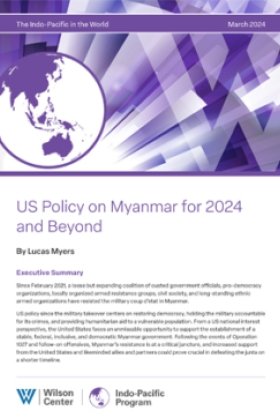Latin American Program in the News: "América Latina vota por su futuro"
Following the Latin American Program's Elections in Latin America event, speakers Cristina Eguizábal, Manuel Torres y Rafael Piñeiro participated in this discussion with Club de Prensa's Julio Marenco. This interview is in Spanish.
Following the Latin American Program's Elections in Latin America event, speakers Cristina Eguizábal, Manuel Torres y Rafael Piñeiro participated in this discussion moderated by Club de Prensa's Julio Marenco. During the discussion, filmed at the Woodrow Wilson Center for International Scholars, the speakers analyzed the upcoming elections in Latin America and the new administration in Honduras.
Eguizábal suggests that a second round is very likely to be needed in the election in El Salvador. She also says that a low turnout will benefit FMLN, which has a larger base of committed voters than ARENA. With regard to a lack of citizen security, Eguizábal observes that every candidate recognizes the problem, but that none have explained what policies they would adopt to combat this. In her opinion, this lack of information is the most serious issue, and citizens need to be informed.
Responding to a question about whether the new administration in Honduras will be able to effectively improve citizen security, Torres suggests that militarizing the police is not the correct response, even though this type of rhetoric was popular during the election.
In Piñeiro's view, the Left's experience in Uruguay is only partially replicable in other countries in Latin America. He notes that Uruguay's Left is the product of its own electoral system, and doesn't necessarily corrrespond to that of Central America. Piñeiro also discusses the legalization of marijuana in Uruguay.
The speakers also describe the Venezuela's influence in the elections, in particular its cooperation with parties on the Left. Eguizábal notes the division between political and more purely economic influence, and Piñeiro emphasizes the distinction between parties that are more populist and parties that are more Social Democratic. Torres observes that during Chávez's lifetime Venezuela's influence made some national conflicts into international conflicts.
Watch the full discussion here.
Related Program

Latin America Program
The Wilson Center’s prestigious Latin America Program provides non-partisan expertise to a broad community of decision makers in the United States and Latin America on critical policy issues facing the Hemisphere. The Program provides insightful and actionable research for policymakers, private sector leaders, journalists, and public intellectuals in the United States and Latin America. To bridge the gap between scholarship and policy action, it fosters new inquiry, sponsors high-level public and private meetings among multiple stakeholders, and explores policy options to improve outcomes for citizens throughout the Americas. Drawing on the Wilson Center’s strength as the nation’s key non-partisan policy forum, the Program serves as a trusted source of analysis and a vital point of contact between the worlds of scholarship and action. Read more









